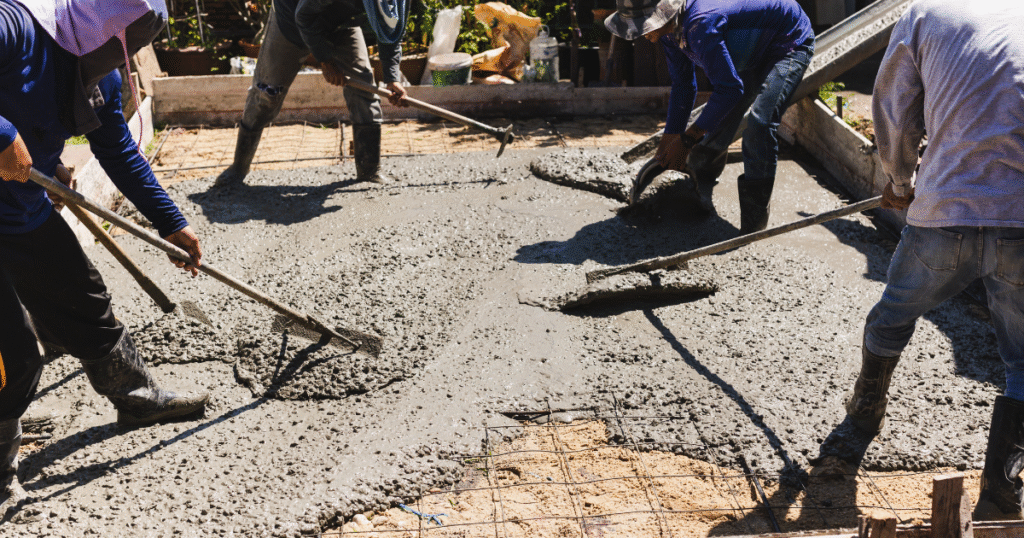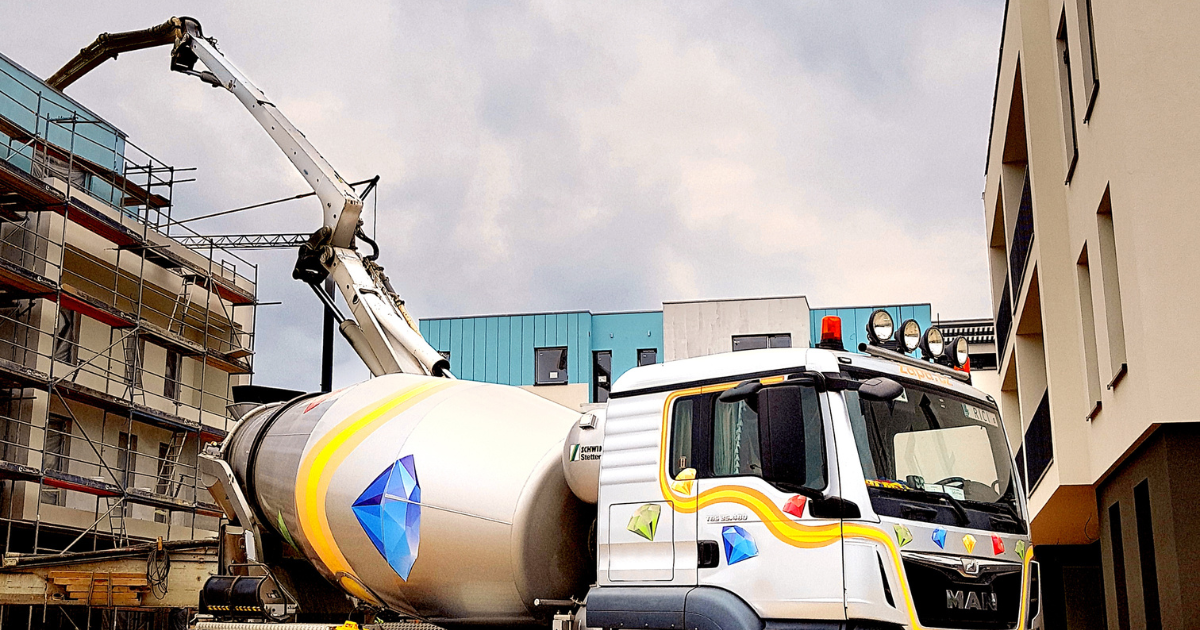Introduction
Ready Mix Concrete (RMC) is a pre-mixed, high-quality concrete manufactured in batching plants and delivered to construction sites in transit mixers. It ensures precision, durability, and efficiency in modern construction, eliminating the need for on-site mixing.

What is Ready Mix Concrete (RMC)?
Ready Mix Concrete (RMC) is a factory-made concrete mixture where cement, aggregates, water, and admixtures are precisely proportioned and mixed before transportation. It is delivered in a plastic, ready-to-use state, ensuring consistency and strength.
Unlike traditional site-mixed concrete, RMC reduces labor, waste, and inconsistencies, making it ideal for large-scale projects like:
- High-rise buildings
- Bridges & highways
- Industrial floors
- Precast concrete structures
For a deeper dive, check this guide on ready mix concrete.
Difference Between Concrete and Ready Mix Concrete
| Feature | Traditional Concrete | Ready Mix Concrete (RMC) |
|---|---|---|
| Mixing Location | Mixed on-site | Pre-mixed in a plant |
| Quality Control | Variable, depends on labor | Consistent, lab-tested |
| Wastage | Higher due to manual errors | Minimal, precise batching |
| Time Efficiency | Slower due to manual mixing | Faster, ready to pour |
| Best For | Small-scale projects | Large, time-sensitive projects |
Dry Mix vs. Ready Mix Concrete
- Dry Mix Concrete:
- Ingredients (cement, sand, aggregates) are pre-mixed dry and water is added later.
- Used in small repairs, bagged concrete products.
- Less consistent than RMC.
- Ready Mix Concrete:
- Fully mixed with water before delivery.
- Ensures homogeneity and strength.
- Preferred for large-scale construction.
Learn more about types and advantages of RMC.
Which Cement is Used in RMC?
Most RMC plants use:
- Ordinary Portland Cement (OPC 43 & 53 Grade) – General construction
- Portland Pozzolana Cement (PPC) – Better durability, lower heat
- Sulfate-Resistant Cement (SRC) – Marine/chemical environments
The choice depends on strength requirements and environmental conditions.
How to Calculate RMC Concrete?
To estimate RMC needed:
- Volume Calculation (for slabs, beams, columns):Volume=Length×Width×ThicknessVolume=Length×Width×ThicknessExample: A 100 sq ft slab (4-inch thick) needs:100×412=33.33 cubic feet (≈1.2 m3)100×124=33.33cubic feet(≈1.2m3)
- Order 10-15% extra to account for spills and uneven surfaces.
Which Chemicals are Used in RMC?
Common admixtures in RMC:
- Plasticizers (Improve workability)
- Superplasticizers (Reduce water content)
- Accelerators (Speed up setting time)
- Retarders (Delay hardening in hot weather)
- Air-entraining agents (Freeze-thaw resistance)
What is M25 in RMC?
M25 is a concrete grade where:
- “M” stands for Mix
- “25” indicates 25 MPa compressive strength after 28 days.
Mix Ratio (Cement:Sand:Aggregate):
- 1:1:2 (with appropriate water-cement ratio)
Used in:
- Residential slabs
- Medium-load structures
For more details, see this resource on ready-mixed concrete.
How Much is 1m³ of Ready Mix Concrete?
Cost varies by region and project specs:
| Region | Approx. Cost per m³ (USD) |
|---|---|
| USA | 120−120−150 |
| UK | £90 – £120 |
| India | ₹4,000 – ₹5,500 |
Factors affecting price:
- Cement grade
- Admixtures used
- Delivery distance
What is the Ratio of RMC?
Common RMC mix ratios:
| Grade | Ratio (Cement:Sand:Aggregate) |
|---|---|
| M10 | 1:3:6 |
| M15 | 1:2:4 |
| M20 | 1:1.5:3 |
| M25 | 1:1:2 |
Process of Ready Mix Concrete Production
- Batching – Weighing raw materials (cement, aggregates, water).
- Mixing – Uniform blending in automated plants.
- Transporting – Delivered via transit mixers (kept rotating).
- Placing – Poured directly at the site.
- Curing – Maintained for optimal strength.
How Much RMC is Needed for 1000 sq ft?
Assuming 4-inch thick slab:1000×412=333.33 cubic feet (≈9.44 m3)1000×124=333.33cubic feet(≈9.44m3)
Order ~10.5 m³ (including wastage).
Density of RMC
- Standard RMC density: 2400 kg/m³ (varies with mix design).
- Lightweight RMC: 1800 kg/m³ (with expanded clay/shale).
Which Cement is Best for Slab Construction?
- OPC 53 Grade (High early strength)
- PPC (Better long-term durability)
Raw Materials for RMC
- Cement
- Fine aggregates (sand)
- Coarse aggregates (gravel, crushed stone)
- Water
- Chemical admixtures
Conclusion
Ready Mix Concrete offers precision, speed, and quality, making it the preferred choice for modern construction. Whether for M25-grade slabs or large industrial projects, RMC ensures strength, consistency, and cost-efficiency.
For further reading, explore:
Got questions? Let us know in the comments! 🚀


q964cd
You are a very bright individual!
Regards for helping out, fantastic info. “It does not do to dwell on dreams and forget to live.” by J. K. Rowling.
Hiya, I am really glad I’ve found this info. Nowadays bloggers publish just about gossips and net and this is actually frustrating. A good blog with interesting content, that is what I need. Thank you for keeping this web-site, I’ll be visiting it. Do you do newsletters? Cant find it.
This is a very good tips especially to those new to blogosphere, brief and accurate information… Thanks for sharing this one. A must read article.
Right now it seems like Movable Type is the top blogging platform out there right now. (from what I’ve read) Is that what you’re using on your blog?
I’m really enjoying the theme/design of your weblog. Do you ever run into any internet browser compatibility issues? A few of my blog audience have complained about my blog not working correctly in Explorer but looks great in Firefox. Do you have any advice to help fix this issue?
whoah this weblog is excellent i love studying your posts. Stay up the great work! You know, lots of persons are hunting round for this information, you could aid them greatly.
I see something really interesting about your weblog so I saved to fav.
thanks
Thanx for the effort, keep up the good work Great work, I am going to start a small Blog Engine course work using your site I hope you enjoy blogging with the popular BlogEngine.net.Thethoughts you express are really awesome. Hope you will right some more posts.
Hi there! This is my first visit to your blog! We are a group of volunteers and starting a new project in a community in the same niche. Your blog provided us beneficial information to work on. You have done a outstanding job!